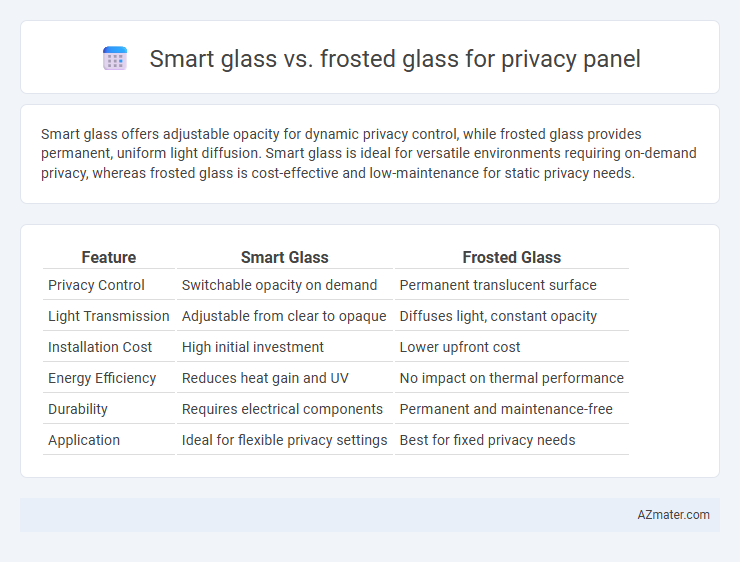Smart glass offers adjustable opacity for dynamic privacy control, while frosted glass provides permanent, uniform light diffusion. Smart glass is ideal for versatile environments requiring on-demand privacy, whereas frosted glass is cost-effective and low-maintenance for static privacy needs.
Table of Comparison
| Feature | Smart Glass | Frosted Glass |
|---|---|---|
| Privacy Control | Switchable opacity on demand | Permanent translucent surface |
| Light Transmission | Adjustable from clear to opaque | Diffuses light, constant opacity |
| Installation Cost | High initial investment | Lower upfront cost |
| Energy Efficiency | Reduces heat gain and UV | No impact on thermal performance |
| Durability | Requires electrical components | Permanent and maintenance-free |
| Application | Ideal for flexible privacy settings | Best for fixed privacy needs |
Introduction to Privacy Panels: Smart Glass vs Frosted Glass
Privacy panels enhance space separation by providing visual obstruction while maintaining light flow. Smart glass uses electrochromic technology to switch between transparent and opaque states instantly, offering dynamic privacy control. Frosted glass employs a textured or sandblasted surface to diffuse light and permanently obscure visibility, ensuring consistent but static privacy.
How Smart Glass Works for Privacy
Smart glass uses electrochromic technology, allowing it to switch from transparent to opaque instantly by applying an electrical voltage, providing dynamic privacy control. This technology manipulates the alignment of liquid crystals or suspended particles within the glass, blocking or permitting light transmission based on user settings. Unlike frosted glass, which offers static privacy through etched or sandblasted surfaces, smart glass delivers customizable opacity levels suitable for various privacy needs.
Understanding Frosted Glass Privacy Panels
Frosted glass privacy panels utilize acid etching or sandblasting to create a translucent surface that diffuses light while obscuring visibility, offering a cost-effective solution for maintaining discretion in office partitions and bathroom enclosures. This type of glass enhances privacy without sacrificing natural light, making it ideal for spaces that require both illumination and confidentiality. Its durability and low maintenance requirements contribute to its widespread use in commercial and residential settings where privacy is essential.
Aesthetic Differences: Smart Glass vs Frosted Glass
Smart glass offers dynamic privacy control by switching between transparent and opaque states, creating a sleek, modern aesthetic that adapts to various lighting conditions and interior designs. Frosted glass provides a consistent, matte finish that diffuses light softly, delivering a classic, elegant appearance with a textured visual effect. The choice between smart glass and frosted glass depends on the desired balance between functionality and static aesthetic appeal in privacy panels.
Performance: Light Control and Privacy Levels
Smart glass offers superior light control with its ability to switch between transparent and opaque states instantly, providing dynamic privacy levels ideal for offices and residential spaces. Frosted glass provides consistent privacy by diffusing light and obscuring visibility but lacks adjustable opacity, resulting in fixed light transmission. In terms of energy efficiency, smart glass reduces reliance on blinds or curtains, enhancing daylight management, while frosted glass delivers passive privacy with no electronic components or energy consumption.
Energy Efficiency Comparison
Smart glass offers superior energy efficiency compared to frosted glass by dynamically controlling light and heat transmission, reducing the need for artificial lighting and HVAC usage. Frosted glass provides consistent privacy but lacks adaptive thermal regulation, leading to higher energy consumption for climate control. Integrating smart glass panels can significantly lower building energy costs through optimized solar heat gain and daylight management.
Installation and Maintenance Requirements
Smart glass installation requires professional handling due to its electrical components and wiring, ensuring seamless integration with control systems. Maintenance involves periodic electrical inspections and careful cleaning to avoid damage to conductive layers, but it is generally straightforward with modern coatings. Frosted glass is easier to install using conventional glazing techniques and requires minimal maintenance, primarily regular cleaning without concerns about electronics or wiring.
Cost Analysis: Initial and Long-Term Expenses
Smart glass exhibits higher initial costs due to advanced technology and installation requirements, typically ranging from $60 to $100 per square foot, compared to frosted glass's average of $15 to $50 per square foot. Long-term expenses for smart glass include energy savings from light control and potential maintenance of electronics, whereas frosted glass incurs minimal upkeep but lacks dynamic privacy control. Evaluating total cost of ownership involves balancing upfront investment against operational savings and desired functionality for privacy panels.
Applications and Suitable Environments
Smart glass offers dynamic privacy control ideal for offices, conference rooms, and healthcare settings where adjustable transparency enhances functionality and aesthetics. Frosted glass provides consistent, permanent privacy suitable for residential bathrooms, partitions, and decorative panels in commercial spaces. Both materials serve privacy needs, with smart glass excelling in environments requiring on-demand privacy and frosted glass preferred for static, low-maintenance applications.
Which Privacy Panel is Right for Your Needs?
Smart glass offers dynamic privacy control through electronic opacity adjustment, ideal for spaces requiring on-demand privacy and energy efficiency. Frosted glass provides consistent, permanent privacy with a textured surface that diffuses light, making it a cost-effective choice for static privacy needs. Choosing the right privacy panel depends on whether you prioritize flexibility and technology integration or a simple, low-maintenance solution.

Infographic: Smart glass vs Frosted glass for Privacy panel
 azmater.com
azmater.com